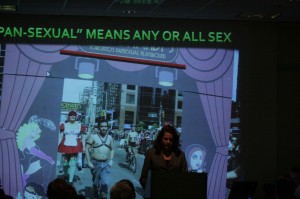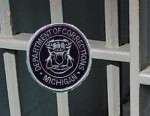
Kalamazoo County Treasurer Mary Balkema presents a slide show while arguing against the anti-discrimination ordinance in Kalamazoo Monday night.
KALAMAZOO — More than 250 people showed up for a Monday night meeting of a Kalamazoo City Commission subcommittee considering the reintroduction of an anti-discrimination ordinance. The ordinance was passed late last year and rescinded in January after opponents gathered the requisite 1,500 signatures needed to block the commission’s approval of the measure. The meeting was one of the first steps toward getting the ordinance, which would prohibit discrimination in housing, employment and public accommodations on the basis of sexual orientation, back on the books.
Individual public comments were allowed following 20-minute presentations by those on either side of the issue.
“As you listen to concerned Kalamazoo residents tonight, I ask that you take into account the vast body of evidence showing how discrimination and bias can negatively and seriously impact the emotional, mental and health and well-being of everyday citizens,” said Sarah VanWormer of the Michigan Project Forum for Public Policy, a coalition of doctors, educators, social scientists and others who review medical studies and their application to public policy.
She then went on to present a summation of studies showing the impact of discrimination on the mental health of LGBT people.
Kalamazoo County Treasurer Mary Balkema, who spoke on behalf of the Kalamazoo Citizens Voting No to Special Rights Discrimination, shared a PowerPoint presentation of images from Toronto and New York City pride marches. She said the behavior shown in the slides, which she described as “lewdness,” was allowed as a result of similarly passed anti-discrimination policies.
“Sold to the unsuspecting citizenry as tolerance, such amendments and policies lead directly to discrimination against people who believe that such behavior is not only wrong, but is completely antithetical to the proper healthy functioning and continuation of society,” Balkema said. She claimed the ordinance would infringe on free-speech and freedom-of-religion rights of citizens in Kalamazoo. She also claimed it would infringe on the right of privacy for women and children in public restrooms.
Balkema claimed the inclusive of gender identity would be a threat to the “privacy and safety” of women and children. Other opponents of the ordinance went further arguing it would allow a man to get his driver’s license changed to identify himself as a woman, allowing him access to the women’s restroom where women and children would likely be raped and assaulted. VanWormer said her group’s research into that claim had found not a single case of a transgender person charged with or brought to trial under such a circumstance anywhere such legislation had been passed.
Closing out the opening remarks was Matthew Laney, pastor of First Congregational Church of Christ in downtown Kalamazoo. Laney spoke in support of the ordinance as a religious leader in the community.
Following Laney’s speech, the subcommittee opened the floor to public comment, which lasted several hours.
At the end of the meeting, Kalamazoo City Commissioner David Anderson, chairman of the special human rights ordinance subcommittee, told participants they could still submit written comments on the ordinance until March 26. Following that, the commission will consider revisions to the ordinance, based on public input and will likely vote on the amended ordinance in the end of April or May, depending on scheduling.
Editor’s Note: An earlier version of this story incorrectly attributed a claim that Kalamazoo’s proposed human rights ordinance would leave a loophole that would “allow a man to get his driver’s license changed to identify himself as a woman, allowing him access to the women’s restroom where women and children would likely be raped and assaulted.” That claim was made by opponents of the human rights ordinance who spoke during public comments and not Kalamazoo County Treasurer Mary Balkema, who also spoke out against the ordinance.




